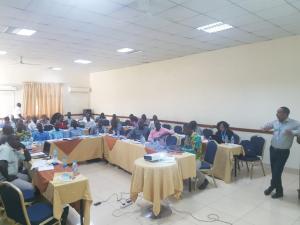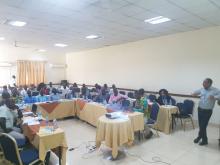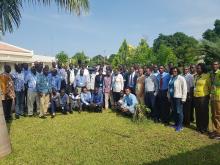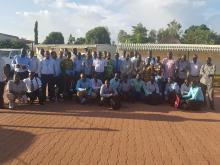WHO in collaboration with partners strengthens Expanded Program on Immunization (EPI) to protect children from vaccine preventable diseases in South Sudan
Juba, 30 July 2017 – Despite the ongoing crisis in the country, the World Health Organization (WHO) continues to support the Ministry of Health of South Sudan and implementing partners to deliver immunization services and conduct disease surveillance activities across the country. Routine immunization and disease surveillance are key health interventions highly affected by the ever changing country context as they demand more logistics and human resource.
To strengthen EPI, WHO held a mid-year review meeting to assess the progress made, set an agenda for the next six months and train the EPI officers on the new mobile data collection tool in-line with WHO Regional Office for Africa (AFRO) accountability framework.
Over 123 participants drawn from all states in South Sudan were trained in two batches to support the upcoming two rounds of Polio Supplementary Immunization Activities (SIA), and finalize the Measles and Meningitis SIA, along with improvement measures for surveillance and routine immunization using the mobile device data collection tool.
The rollout of the mobile data collection tool can greatly speed up the data collection process and reduce transcription errors. Data transmission over mobile networks will also ensure that no data are lost ‘in transit’.
In his remarks, Dr Abdulmumini Usman, the WHO Representative to South Sudan, encouraged the state EPI officers to support and guide the State Ministries of Health and partners in all health programmes to save lives. Besides he urged participants to be accountable for the resources received from the generous support of donors.
With support from WHO and partners, the Ministry of Health continues to make progress. At week 27, the national annualized Penta 3 coverage for 2017 remains at 44%, and 70% of counties have reported at least one case of suspected AFP. It is hoped that with the training these indicators will continue to improve.
Under the leadership of the Ministry of Health, WHO and partners continue to support the government of South Sudan to remain polio-free and ensure that efforts to protect children and future generations are well coordinated.






